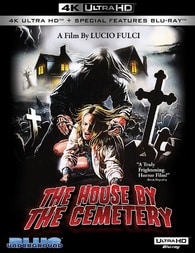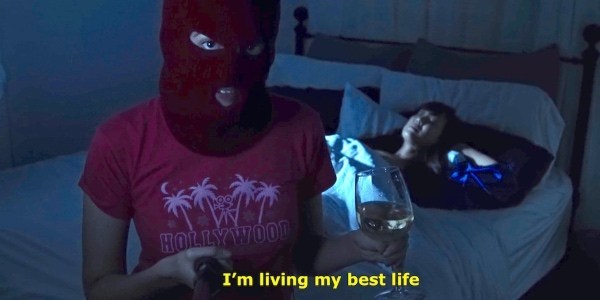THE VIGIL: Your Watch Has Begun
Horror films for decades, and arguably since their induction, have found inspiration from real-life horrors that have surrounded their creators – and real life in general. It is these horror films, born out of reality, that scare us the most; the thread of real-life woven into jump scares, gore and hauntings. The Vigil, from writer and director Keith Thomas, is the latest to enter the fold, bringing with it a multilayered examination of grief, remorse, and forgiveness with immense success.
A watch you will volunteer for time and again
The beginning of The Vigil is wholly engaging, an intensified heartbeat of anxiety within a tightly contrasted closeup to a wide-angle blurred image of a creature emerging from the woods. There is confusion and heightened fear, the muffled screams, a gun, and the beating score pulsating through the opening. From its first few minutes, The Vigil is clearly not giving anything away and unafraid to leave its viewers in the dark. It is an opening that is immediately contrasted by its following scene, permanently ensnaring the attention of its audience.
Transitioning from the intensity of its beginning, there is a quietness that befalls the film, the loud introduction silenced within the meeting of a local support group. The continuity of confusion is maintained as you do not know what they are supporting each other for or what has brought each person there. As the camera moves around the group, eventually setting its focus on a young gentleman, clearly uncomfortable with his surroundings and self. Yakov is embraced by the group, but unsure of his placement there. Asked about how he is doing and his job status, he reluctantly opens to the group, revealing quietly the depth of his struggles, admitting he is at a point of choosing between medication and food.
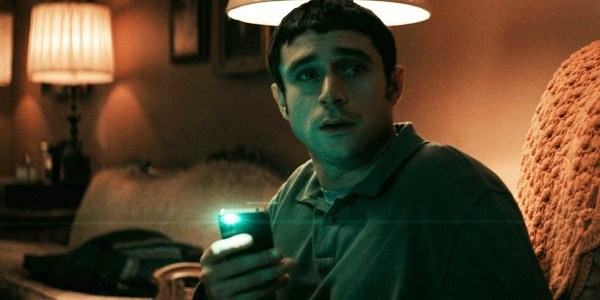
There is a bread crumb trail laid out for views in the support group, little tidbits to nibble on now, and others to store for later. There is the introduction that the character is being treated in some way, facing difficulty in maintaining his treatment course, all while delivering the secretively understanding that he “had a good reason for leaving”. There is intrigue within his story, his past, and where the film will be taking him, much of this is built upon the confusion and intensity of the beginning.
He is greeted with the expectant platitudes from the group – “what matters is we are moving forward” – yet they feel as empty as our understanding because like the audience, they have little knowledge of who Yakov is. Following these moments within the support group, Yakov is greeted outside the building by Reb Shulem – who reads more like a mafia man than a returned figure from his past. While you are immediately against him as a viewer due to his initial introduction, he is the first individual who seems to know Yakov. And so we continue along with them as they walk through the streets of Brooklyn, the intentions of his visit slowly being revealed.
The Vigil immediately finds success in its intricate and delicate layering of the narrative, giving pieces of information as it goes, allowing time for viewers to digest each tidbit given. There is an understanding that The Vigil welcomes the audience to its concepts and mythology, embracing all who join the main character on his journey. As Yakov and Reb walk to their destination, The Vigil does lend itself to a bit of hand-holding, leading the audience along, motioning where it is intending to go. While slightly distracting, the film thankfully does not cling to this technique, rather utilizing it to set up its second act, and allowing audiences to work through the environment it is about to introduce.
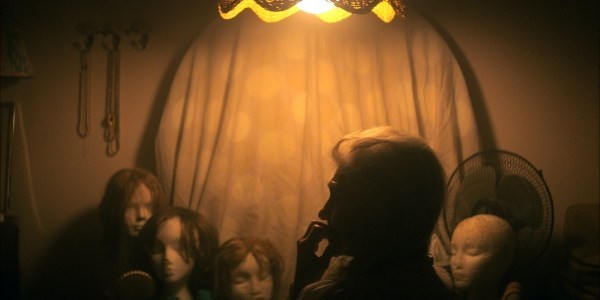
Reb has arrived to ask Yakov to be the Shomer for a gentleman who has passed, an Orthodox Jewish tradition of looking after a dead body over the course of an evening. While initially hesitant, Yakov agrees, as he is desperate for money. It is not long until this common practice begins to set itself up for a turn for the worst, the widow of the man he is to hold vigil for greets him with fear, demanding that “he needs to leave now.” While he does not heed her warning, the vigil he is about to undergo becomes more than just a watch to protect the body of a man who has passed, but a fight for his soul.
Crafting the horrors of trauma and guilt
At its core, The Vigil is an intimate portrait of the deep manifestations of trauma and guilt, and the journey one must take to overcome them. Yet, as simple as these concepts may seem, crafting a world that encompasses and personifies it is not always the easiest to bring to life. For The Vigil, there is a lot of green lighting within the film, deeply contrasted by oranges hues. There is a sharpness created by the contrasting colors, defined lines between them sometimes blurred and melting into one another, other times clearly divided, a black void between them. There is a feeling of the representation of life and death, of reality and fiction, and of the past and the present. As Yakov moves around the house, the lighting changes around him as much as it stays stagnant, Yakov moving through them. There is a push and pull it creates with the character, pushing him beyond his comfort level, yet allowing him the space to move within its representations.
Beyond lighting, The Vigil delights in its misdirection, allowing it to be rife with jump scares and stomach inducing imagery. What begins as a seemingly parallel to the loss of faith one experiences, warps into something sinister and painstaking. Furthermore, a parallel to the man whose body Yakov is protecting is created, mirrored movements of twitching and rigor mortis between the characters leading into deeper similarities within the elements of memory.
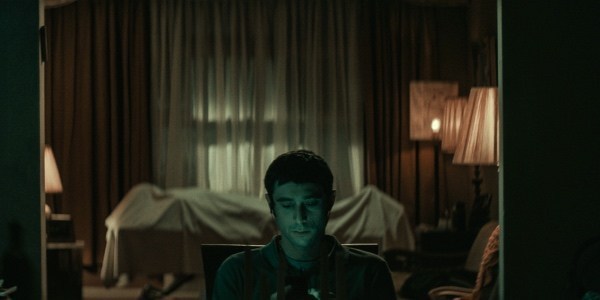
There are a lot of ways an audience may perceive The Vigil, expanding on the breadth the film can speak to. For some, it can read as an examination of mental health, while for others the aftermath of trauma – a PTSD that remains unattended. Still, for others, it is an examination of the burden of grief and the darkening journey one must take to return from that. It is one and all of these, wrapped within the horrors of a haunted house, spirits, and horror. For myself, I felt all of these, yet it was the idea surrounding guilt that resonated the most. Yet, it wasn’t just the guilt, but the subsequent journey that accompanies it – and the loneliness of that journey. There may be those to help along the way, but the decisions and paths chosen can only be made by the one seeking healing and forgiveness.
This message resonates as strongly as it did due to its leading man Dave Davis, delivering a phenomenal performance as Yakov. There is a strength and fear that resides in him, both of the worlds around him and of himself. He balances these dueling moments of humanity, allowing his character the opportunity to experience each aspect fully, without going over the top or under-delivering. For much of the film, he is left to act with himself, his reactions in response to things he may see quickly or moments he finds himself trapped in. Davis is unafraid to give his character a true journey from start to finish, embracing both the dark and light the film promises.
Delivering an equally strong performance is Lynn Cohen, who passed in February of 2020. It is not just in the words that she speaks, or the transition between lucidity, but also in her body language. There is one scene in particular where Yakov is towering over her, and while she is clearly smaller in comparison, she is bigger and braver than the man before her. While this can be chalked up to composition and framing, there is an energy that radiates from Cohen, one that consistently comes through in her performance for the entirety of the film.
Conclusion
The Vigil ends with both heartbreak and hopefulness. And what is truly beautiful is in the way the film ends. There is no neatly-tied bow, giving viewers the peaceful conclusion we wish for the film’s characters. Rather, an acknowledgment that there is still further to go – that you must continue forward, understanding one’s journey can not be concluded in one evening. And in the end, only you can make the decisions for where your journey will continue to take you.
Have you seen The Vigil? What did you think? Let us know in the comments below!
The Vigil will be released on VOD on February 26, 2021.
Watch The Vigil
Does content like this matter to you?
Become a Member and support film journalism. Unlock access to all of Film Inquiry`s great articles. Join a community of like-minded readers who are passionate about cinema – get access to our private members Network, give back to independent filmmakers, and more.
Join now!

